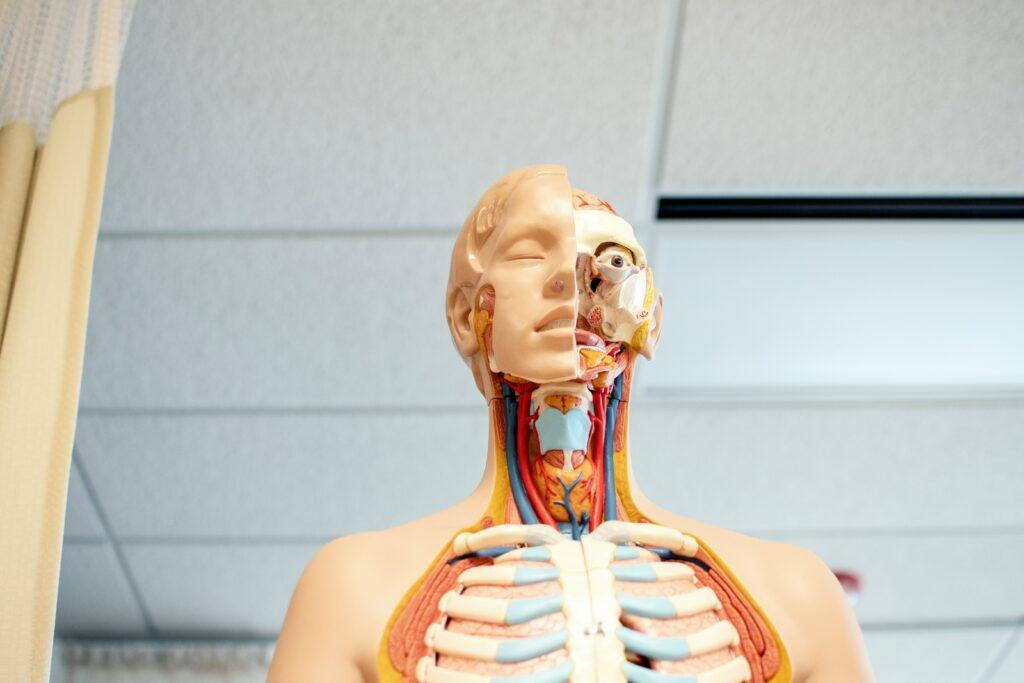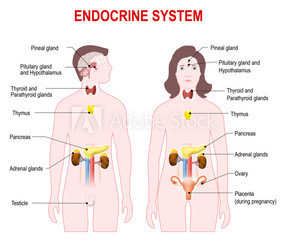The body comprises many systems, one of which is the endocrine system. You may be curious to know how does the endocrine system work.
This system is as intricate as all the other systems of the body. Although it is quite fascinating, disorders and imbalances usually occur.
We function on different levels based on what is going on in our bodies. And we usually know when something is not working the way it should.
A healthy body tends to have most thing functional well. In contrast, an unhealthy body has abnormalities taking place. Some are evident while others are not.
Furthermore, symptoms may manifest on the inside. Others show up on our skin. How do you know when there’s an abnormality in your body? There are several ways you can find out. One way is to pay attention. You’ll get clues.
First, let’s look at a breakdown of the body’s makeup.

The Body’s Makeup | Let’s Break It Down.
The body is fascinating, complex, and impossible to recreate. Four basic structures are cells, tissues, organs, and systems. Later, we’ll get back to answering the question, “How Does the Endocrine System Work.”
- Cells are made up of smaller units contained within them; however, cells function independently. They also regulate all areas of life in the human body.
- Tissues are made up of cells. These cells are usually similar, but other related cells may be part of a tissue. And together they carry out a specific function or functions.
- Likewise, organs are a combination of tissue which carry out specific functions as specified by their hormones.
- Systems are a group of organs, and together they meet the needs of different areas of the body.
Of course, the body is made up of so much more such as elements also present in the earth and atmosphere.
What Is The Endocrine System? | Let’s Take a Look.
The endocrine system is made up of several glands which produce their own unique hormones. These are released into the bloodstream to carry out various functions throughout the body. This system is responsible for growth and development, reproduction, metabolism, and others.
The main glands are pituitary, pineal, thyroid, parathyroid, adrenal, pancreas, ovaries, and testes.
Well, how does the endocrine system work? Here’s how…
All the major glands of the endocrine system target different cells and organs. The reproductive organs, for example, are controlled by the estrogen and testosterone hormones regulating male and female reproduction activities.
The pituitary gland produces hormones responsible for growth, production of milk for breastfeeding, estrogen and testosterone. It receives information from the brain and passes it on to other glands. Subsequently, these glands use the information to help the organs they control carry out their functions.
The pineal gland plays a part in helping to prepare the body for sleep by producing melatonin. On the other hand, the hormones of the thyroid glands regulate metabolism.
The levels of calcium and phosphorus determine how healthy our bones are. And these are controlled by the parathyroid glands.
Adrenal glands produce adrenaline, in addition to hormones which regulate metabolism and sexual functions. Adrenaline helps us to take action when we feel threatened–flight or fight.
Finally, the pancreas produces insulin and glucagon which regulate sugar in the body. Overall, the endocrine system is responsible for ensuring optimal functioning of the organs systems in the entire body.
The Endocrine System | Working To Maintain Balance
Amidst the complexities of this unique system, its job is to maintain balance. That is ensuring hormone production and that communication with other systems and organs is clear.
Messages are transmitted from the brain, the central nervous system. This super highway keeps working involuntarily to accomplish its mission. And we see this from the different glands and their hormones mentioned above.
The entire endocrine system works in cycles either individually or several together. We see this as the pituitary glands send messages from the brain, stimulating other glands and organs to get their jobs done.
There is a chain of command which leads to irregularities when broken. Otherwise, when everything is going according to plan, combined with wholesome practices, we enjoy the benefits of good health.
Some of these practices include proper nutrition, exercise, and sleep. Are you eating the right foods for your body? Also, do you take time out to do activities that help to circulate blood and strengthen your body?
Finally, do you get good quality sleep? You know the answers to these questions. Pay attention as you identify the areas you need to improve.
Take preventive action now. You may also be able to restore what may have already gone wrong. Most importantly, it is best to start now before it is too late. Your body “speaks” to you. Listen carefully for signs. It could save your life!

An Intricate System | Nevertheless, There Is A Problem
We would like to see everything functioning in our bodies without disorders and diseases; however, this is not always the case.
Sometimes there is miscommunication or non communication caused by different factors. Some irregularities are under or overproduction of hormones.
An example is excessive production of testosterone in women, which may lead to hirsutism, excessive hair growth that is typical in men.
Another example is hypothyroidism or hyperthyroidism due to irregularities of the thyroid glands. This causes the slowing down or speeding up of body functions, respectively.
There is a vast amount of information about the endocrine system. So, you’ll have a better understanding of your body and the many changes you go through as you take time out to learn more.
Symptoms in one area are usually stemmed from something going on in other areas.
Be mindful also that irregularities may be taking place in the endocrine system as well as other systems within the body. Therefore, it’s best to consult your doctor and/or get a referral to an endocrinologist.
Is This The End? | Let’s Recap
Here’s the thing: There is a chain of command in the universe, man-made organizations, and our bodies. It is fascinating to learn about its complexities–cells making up tissues, which make up organs, which make up systems.
The endocrine system plays a key role in producing hormones through its glands. They get to their target location throughout the body as they travel through the bloodstream.
The endocrine system strives to maintain balance in all areas. It’s a superhighway having a chain of command governing it. We enjoy the privilege of optimal health when everything is functioning properly–when the cycle isn’t broken.
We looked at the main glands in the endocrine system–pituitary, pineal, thyroid, parathyroid, adrenal, pancreas, ovaries, and testes. Each of their hormones enables functioning of the organs they target.
These functions include growth and development, reproduction, metabolism, and others. Life isn’t perfect, and we must face the reality that there will be issues arising from hormonal and other imbalances.
Hopefully, we’ll have a better understanding of our bodies and how it works and subsequently take the necessary actions to eliminate some of the problems.
Remember, an endocrinologist specializes in matters pertaining to the endocrine system. That’s also a good place to start to have your questions answered and get treatment as necessary.
It’s important to ask questions while you seek to take control of your own health. Your body deserves to be in optimal shape. You can make a difference. Take action today!
Spread to word to your family and others. They also need to know how to take better care of themselves.
I hope this short article, “How Does the Endocrine System Work,” has helped you in some way. Feel free to leave your questions and comments below. I will do my best to address them.
Years ago, a close friend of mine started to suffer from some “strange” symptoms. Their legs were always swollen, they gained a lot of weight and could not control it and, most importantly, their behaviours were all over the place. They became erratic, unpersonable, controlling and unable to keep calm.
After going to many doctors over a few years, they were diagnosed with endocrine problems. Their thyroid glands were misfunctioning causing excessive flows of adrenaline into their body. It turns out that they had a tumour on their adrenal gland.
Before this, I had no idea that our endocrine glands were critical to good health. Your article reminded me of this. There is a lot of information to help us understand how the endocrine system works. I wish I had this all those years ago. Thank you for sharing!!
Cassi
Hi Cassi:
Thank you for taking the time to read my article and sharing your friend’s story. This will definitely shed light on someone else’s experience who may or may not know their diagnosis. Similarly, it could also be a friend’s story.
It’s good when they can finally get to the root of the matter and the help they need to live a more wholesome life. These conditions are usually traumatic for everyone concerned.
Thanks again. I appreciate you!
Veron
Firstly, thanks very much for this article, I found it engaging and informative. However, the one thing that really caught my attention was that you mentioned that the endocrine system is made up of several glands, and through it’s function, produces their own unique hormones.
I studied mortuary science back in 2000, and we touched on the endocrine system, among other organs of the body. Healthy growth of our bodies, along with our metabolism development and reproduction is ‘key’ to a properly functioning endocrine system.
Hi RJ:
Thank you so much for your time and comments on my article. This is an important topic for me, and it’s a pleasure to share whenever possible. I’m happy you found it engaging and informative.
The body is an amazing structure, and studying it reveals so much we wouldn’t automatically know. I’m sure your studies have opened your eyes to its complexities.
I really appreciate your input.
Veron